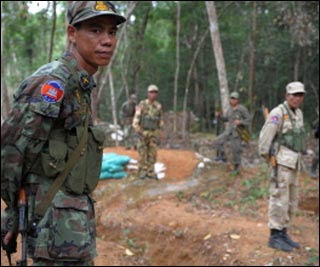via Khmer NZ
Sunday, August 15, 2010
PHNOM PENH, Aug. 15, 2010 (Xinhua News Agency) -- Cambodian Deputy Prime Minister Sok An said that the economic and trade relations between Cambodia and China are very good, in an recent interview with Xinhua.
In an recent interview with Xinhua, Sok An said the economic and trade relations between the two countries, which started centuries ago, have been strengthened and expanded significantly in recent years, adding "If you go shopping in Cambodia, you will find many products labelled MADE IN CHINA, ranging from kitchenware to high-tech products such as telecom equipments."
China has been a significant foreign investor in Cambodia, he said, with thousands of Chinese companies, big and small, operating in sectors such as textiles and garment, hydroelectric power, agriculture and mining. China's investment, measured in fixed assets, increased to 930 million U.S. dollars in 2009 from 461 million U.S. dollars in 2007, and in the 1st semester of 2010, the investment is 234 million U.S. dollars.
Sok An, also the minister of the Council of Ministers, said that the trade between Cambodia and China has also substantially increased. The bilateral trade (imports plus exports) was about 138 million U.S. dollars in 1998, and it has increased to more than 946 million U.S. dollars in 2008, an increase of about sevenfold over the last ten years.
In terms of tourism sector, the minister said that Chinese tourist arrivals in Cambodia have ranked among the top 5 during the last 5 years. But it moved to the 3rd place after South Korea and Vietnam in the first half of 2010, with the number of tourists reaching 84,335.
The minister also commended Chinese government's decision to provide duty exemption for 418 items or tariff lines for Cambodian products to enter into Chinese markets, which he considered as an acceleration for more bilateral economic activities between the two countries.
Sok An said "These activities have undoubtedly contributed to the Royal Government's efforts to reduce poverty and to increase the living standard of the Cambodian people. The Chinese people have also benefited from this good economic relation and cooperation."
Talking about the future cooperation on trade and economy between the two countries, Sok An said that Cambodia needs more financial and technical support for further development of physical infrastructure such as irrigation system, roads and bridges, as well as for human resources development. "So, I firmly believe that China will consider this positively."
Cambodia also has great potential in several important sectors such as agriculture, agro-industry, infrastructure, labor- intensive industries, exports-oriented industries, exploration and exploitation of natural resources such as oil and gas, mining as well as tourism. "These sectors offer many investment opportunities," Sok An said.
Chinese investors are encouraged to explore these opportunities and other business potentials, he said.















